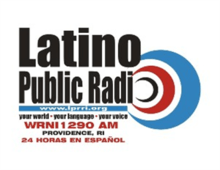WRNI (AM)
| City | Providence, Rhode Island |
|---|---|
| Broadcast area | Providence, Rhode Island |
| Branding | Latino Public Radio |
| Frequency | 1290 kHz |
| First air date | December 15, 1947 |
| Format | Public radio |
| Language(s) | Spanish |
| Power | 10,000 watts fulltime |
| Former callsigns |
WDEM (1947–1952) WICE (1952–1983) WRCP (1983–1998) |
| Owner |
Rhode Island Public Radio (brokered to Latino Public Radio) |
| Sister stations | Rhode Island Public Radio |
| Webcast | Listen Live |
| Website |
www |
WRNI (1290 AM; "Latino Public Radio") is a radio station in Providence, Rhode Island broadcasting Spanish-language public radio programming. It is owned by Rhode Island Public Radio, but brokers its airtime to Latino Public Radio.[1]
History
The station went on the air in 1947 as WDEM. It changed to WICE in 1952 to signify its broadcasting the Providence Reds hockey team. During the 1960s and 1970s, WICE presented a top 40 music format, and was owned by Susquehanna Radio. It switched to Portuguese programming as WRCP in 1983.
As an English-language public radio station

In the 1990s, a group of Rhode Islanders formed the Foundation for Ocean State Public Radio in order to bring a local public radio station to the state. At the time, Rhode Island was the only state in New England (traditionally one of the bedrocks of support for NPR) and one of only two in the entire country (the other being Delaware) that didn't have a full-service NPR station within its borders. Most of the state got at least a grade B signal from Boston's WGBH (with Providence itself receiving a city-grade signal) and WBUR. After a few years of looking, they found a partner in Boston University, owner of WBUR. BU agreed to buy WRCP for $1.9 million; the foundation conducted a statewide drive to help raise the funds.
On May 1, 1998; WRCP's calls officially changed to WRNI, and the license was officially transferred to the WRNI Foundation, a separate fundraising group set up by WBUR to handle local underwriting.
Even though BU doubled WRNI's transmission power from 5,000 watts to 10,000 watts, its signal was not strong enough to reach the southern and western portion of the state (though it provides a city-grade signal to Newport, southern Rhode Island's biggest city). Accordingly, in 1999, BU bought WERI in Westerly, which had been on the air since 1949. BU changed WERI's calls to WXNI, and made it a full-time satellite of WRNI. The station brought a city-grade NPR signal to southern Rhode Island for the first time ever.
BU and WBUR had very big plans for WRNI at first. It moved WRNI from its longtime studio on Douglas Avenue to a state-of-the-art facility at Union Station. It also started a daily two-hour local news magazine, One Union Station. [2] It also had plans to set up a third station to fill the gaps in WXNI's 1,000-watt signal.[3] However, budget problems brought on by the September 11, 2001 attacks forced One Union Station's cancellation. It was replaced with a one-hour news magazine that was canceled in 2004. At that point, WRNI's local operations were significantly cut back, with most of the station's staff either laid off or transferred to Boston. This resulted in WRNI's schedule becoming almost identical to that of WBUR.
Controversy over sale
On September 17, 2004, with no advance warning, WBUR Group general manager Jane Christo announced that WRNI and WXNI were being put on the market. She wouldn't give any specifics, only saying that it was time for Rhode Islanders to buy the stations if they wanted to keep NPR programming in the state.[2] Indeed, WBUR claimed that it never intended to operate WRNI on a long-term basis, and had only intended to help develop it into a self-sustaining service.[3]
The reaction in Rhode Island was, not surprisingly, hostile. In an editorial, The Providence Journal said that WBUR had made numerous long-term commitments to WRNI. The Journal claimed that if the station's local backers had to buy WRNI, it would be tantamount to buying the station twice.[4] The announcement led state attorney general Patrick Lynch to open an investigation into WBUR and WRNI.[5]
On September 27, BU interim president Aram Chobanian delayed the sale of WRNI and WXNI, citing concerns raised by both Lynch and Rhode Island Governor Don Carcieri. Memos obtained by The Boston Globe revealed that WBUR felt the Rhode Island stations were money bleeders, and had decided to either lease or sell the stations at the earliest opportunity.[6] The furor over the WRNI sale was one factor in Christo's resignation almost a month later.[7]
In June 2005, BU took WRNI and WXNI off the market. It promised to hire a full-time general manager based in Providence, and also stepped up local news coverage. As a result, Lynch closed his investigation in November 2006.[5]
On March 21, 2007, WBUR announced that it was selling WRNI to Rhode Island Public Radio—formerly the Foundation for Ocean State Public Radio—for $2 million. Rhode Island Public Radio also announced it was buying WAKX in Narragansett Pier from Davidson Media to serve as a repeater for WRNI in southern Rhode Island.[8] WAKX, which signed on in 1989, had been a smooth jazz station. As part of the sale agreement, BU will continue to provide engineering and programming assistance to RIPR for five years.
RIPR officially took control of WAKX on May 17, 2007; changing the calls to WRNI-FM. The addition of WRNI-FM made WXNI redundant, and BU has sold that station separately to Diponti Communications, which renamed it WBLQ. RIPR took control of WRNI on September 1, 2008.
RIPR registered the domain name ripr.org on February 13, 2007; the site was live as of June 2007.
As a Spanish-language public radio station

On October 8, 2011, RIPR dropped its English-language public radio programming from the 1290 AM signal and brokered its airtime to Latino Public Radio.
LPR's programming had previously been heard part-time on The Wheeler School's WELH (88.1 FM); that station replaced WRNI as flagship of the Rhode Island Public Radio network, which also includes WRNI-FM and WCVY in Coventry.
The move also makes LPR eligible for Corporation for Public Broadcasting funding.[1]
References
- 1 2 Ziner, Karen Lee (October 7, 2011). "R.I. Latino radio station going 24/7 in new place". The Providence Journal. Retrieved October 10, 2011.
- 1 2 NorthEast Radio Watch by Scott Fybush
- 1 2 Current.org | Struggle over WBUR's Rhode Island stations, 2004 Archived September 27, 2011, at the Wayback Machine.
- ↑ Editorials | Rhode Island news | projo.com | The Providence Journal
- 1 2 "Rhode Island attorney general ends investigation into WBUR, WRNI - Boston.com".
- ↑ Jurkowitz, Mark (September 28, 2004). "BU delays sale of R.I. radio stations". The Boston Globe.
- ↑ Current.org | Christo resigns at WBUR, 2004 Archived September 27, 2011, at the Wayback Machine.
- ↑ "R.I.'s public radio station being sold - Boston.com".
External links
- Official website
- Query the FCC's AM station database for WRNI
- Radio-Locator Information on WRNI
- Query Nielsen Audio's AM station database for WRNI
Coordinates: 41°51′21″N 71°26′41″W / 41.85583°N 71.44472°W